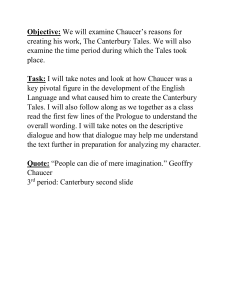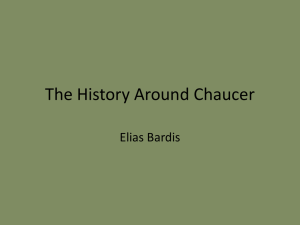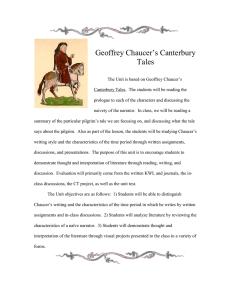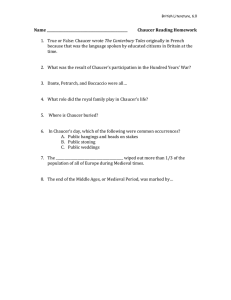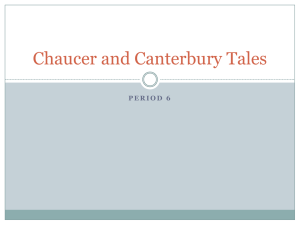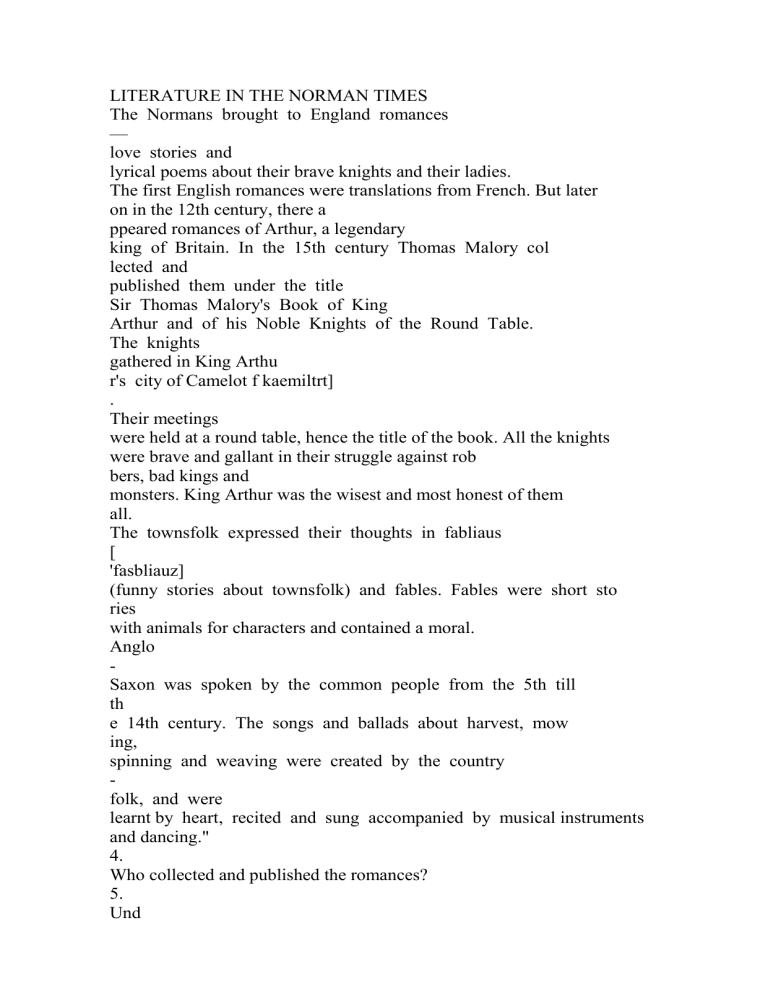
LITERATURE IN THE NORMAN TIMES The Normans brought to England romances — love stories and lyrical poems about their brave knights and their ladies. The first English romances were translations from French. But later on in the 12th century, there a ppeared romances of Arthur, a legendary king of Britain. In the 15th century Thomas Malory col lected and published them under the title Sir Thomas Malory's Book of King Arthur and of his Noble Knights of the Round Table. The knights gathered in King Arthu r's city of Camelot f kaemiltrt] . Their meetings were held at a round table, hence the title of the book. All the knights were brave and gallant in their struggle against rob bers, bad kings and monsters. King Arthur was the wisest and most honest of them all. The townsfolk expressed their thoughts in fabliaus [ 'fasbliauz] (funny stories about townsfolk) and fables. Fables were short sto ries with animals for characters and contained a moral. Anglo Saxon was spoken by the common people from the 5th till th e 14th century. The songs and ballads about harvest, mow ing, spinning and weaving were created by the country folk, and were learnt by heart, recited and sung accompanied by musical instruments and dancing." 4. Who collected and published the romances? 5. Und er what title did Thomas Malory collect the books? 6. What was the book about? 7. Where did the townsfolk express their thoughts? 8. What was created by the country folk? 9. Say how the Norman Conquest affected English literature. Vocabulary accompany [ э ' клтрэга ] ^ сопровождать legendary ['leapndgn] а легендарный contain [ кэп Чет ] v содержать mowing [' тэшп ] п косьба fable f'feibl] n басня recite [rfsait] v декламировать fabliau [fae'blisu] n фабльо romance [re'maens] n роман gallant ['gsebnt] а храбрый spinnin g ['spmm] n прядение hence [hens] adv отсюда weaving ['wi:virj] n тканье knight [nait] л рыцарь wise [waiz] а мудрый Questions and Tasks 1. What stories did the Normans bring to England? 2. What were the first English romances? 3. What romances appeared in the 12th century? 30 * English Literature in the 14th Century PRE RENAISSANCE IN ENGLAND The Norman kings made London their residence. The London dialect was the central dialect, and it was understood throughout the country. It was the London dialect from whic h the national language developed. In the 14th century the English bourgeoisie traded with Flan ders (now Belgium) . The English sold wool to Flanders and the latter produced the finest cloth. England wanted to become the centre of the world market. Flemish weavers were invited to Eng land to teach the English their trade. But feudalism was a serious obstacle to the development of the country. In the first half of the 14th century France threatened the free towns of Flanders, wish ing to seize them. England was afraid of losing its wool market. A collision between France and England was inevitable. King Edward III made war with France in 1337. This war is now called the Hundred Years' War because it lasted over a hundred years. At first England was successful in the war. The English fleet defeated the French fleet in the Channel. Then the English also won battles on land. B \ it the ruin of France and the famine brought about a terrible disease called the "pestilence" . It was brought over to England from France . The English soldiers called it the "Black Death" . By the year 1348 one third of England's population had perished. The peasants who had survived were forced to till the land of their lords. As years went on, the French united against their enemy. As the king needed money for the war, Parliament voted for extra taxes. The increasing feudal oppression, cruel laws and the growth of taxes aroused people's indignation and revolts broke out all over the country. In 1381 there was a great uprising with Wat Tyler at the head. The rebels set fire to the houses, burnt valuable things, killed the king's judges and officials. They demanded the aboli tion of serfdom and taxes, higher wages and guarantees against feudal oppression. But the rebellion was suppressed, and Wat Tyler was murdered. Nothing made the people so angry as the rich foreign bishops of the Catholic Church who did not think about the sufferings of the people. The protest against the Catholic Church and the growth of national feeling during the first ye ars of the Great War found an echo in literature. There appeared poor priests who wandered from one village to another and talked to the people. They protested against the rich bishops and also against all churchmen who were ignorant men and did not want t o teach the people anything. Such poor priests were the poet William Langland and John 4 Wycliffe. They urged to fight for their rights. But the greatest writer of the 14th century was Geoffrey Chaucer, who was the writer of the new class, the bourgeoisie. He was the first to clear the way for realism. Vocabulary abolition Laebs'lifgn] л отмена bishop ['bijbp] л епископ collision [ кэ '11 зэп ] л столкновение echo [' екэи ] л отражение famine ['fsemm] л голод Flanders ['flaindaz] л Фландрия Flemish ['flemij] а фламандский force [fo:s] v заставлять guarantee Lgasran'ti:] v гарантировать 32 33 ignorant ['ignsrent] а невежественный indignation [^mdig'neifan] n возмуще ние , негодование inevitable [m'evitabl] а неизбежный latter ['tets] а последний obstacle ['obstakl] л препятствие official [s'ftjbl] n чиновник ; служащий oppression [ э ' рге / эп ] л угнетение ; гнет outcome ['autksm] л последствие tax [tasks] n налог threaten ['Gretn] v угрожать throughout [9ru:'aut] adv повсюду till [til] v обрабатывать ( землю ), пахать urge [ з : с &] v побуждать , заставлять wander ['wands] v бродить weaver ['wirval n ткач Questions and Tasks 1. Describ e the political situation of England in the 14th century. 2. How did people react to growing feudal oppression? 3. Talk about Wat Tyler's Rebellion and its outcome. 4. What was the result of the protest against the Catholic Church? 5. What did poor priests protest aga inst? 6. What do you know about the poets William Langland and John Wycliffe? 7. Who was the greatest writer of the 14th century? Geoffrey Chaucer (1340 1400) The most vivid description of the 14th century England was given by Geoffrey Chaucer [ 'd3efn 'tfo:ss]. He was the first truly great writer in Eng lish literature and is called the "father of English poetry". Chaucer was born in London, into the family of a wine merchant. His father had connections with the court and hoped for a courti er' s career for his son. At seventeen Ge offrey became page to a lady at the court of Edward III. At twenty, Chau cer was in France, serving as a squire. During 1373 and the next few years Chaucer travelled much and lived a busy life. He went to France, made three journeys to Italy. Italian literature opened to Chaucer a new world of art. Chaucer's earli est poems were written in imitation of the French romances. The second period of Chaucer's literary work was that of the Ital ian influence. To this period b elong the following poems: The House of Fame, The Parliament of Fowls, a poem satirizing Parliament, The Legend of Good Women and others. When Chaucer came back to England, he received the post of Controller of the Customs in the port of London. Chaucer he ld this position for ten years. He devoted his free time to hard study and writing. Later Chaucer was appointed "Knight for the Shire of Kent", which meant that he sat in Parliament as a representa tive for Kent. He often had to go on business to Kent and there he observed the pilgrimages to Canterbury. The third period of Chaucer's creative work begins in the year 1384, when he started writing his masterpiece, The Can terbury Tales. Chaucer died in 1400 and was buried in Westminster Abbey. Chaucer was the last English writer of the Middle Ages and the first of the Renaissance. Vocabulary court [ko:t] n двор короля courtie r [' кэ : ф ] п придворный esquire [is'kwaia] n оруженосец pilgrimage ['pilgnmKfe] n паломни чество Questions and Tasks 1. Give the main facts of Chaucer's life. 2. What were the sources of Chaucer's creative work? 3. Speak about the three periods of Chaucer's creative work. 4. What is his masterpiece? 5. When did Chaucer die? 6. Where was he buried? 34 35 perish ['penfl v погибать pestilence ['pestibns] n чума rebellion [n'beljsn] n восстание revolt [ri'vault] n восстание serfdom ['s3:fdsm] n крепостное право suppress [sa'pres] v подавлять survive [sg'vaiv] v выжить , уцелеть Geoffrey Chaucer post [psust] n поет , должность satirize ['saetaraiz] v высмеивать shire [fara] n графство source [so:s] n источник vivid ['vivid] о яркий The Canterbury Tales This is the greatest work of Chaucer in which his realism, iro ny and freedom of views reached such a high level that it had no equal in all the Engl ish literature up to the 16th century. That's why Chaucer was called "the founder of realism". It is for the Canterbury Tales that Chaucer's name is best remembered. The book is an unfinished collection of stories in verse told by the pilgrims on their jou rney to Canterbury. Each pilgrim was to tell four stories. Chaucer managed to write only twenty four instead of the proposed one hundred and twenty four stories. All his characters are typical representatives of their classes. When assembled, they form one people, the English people. Chaucer kept the whole poem alive and full of humour not only by the tales themselves but also by the talk, comments and the opinions of the pilgrims. The prologue is the most interesting part of the work. It acquaints the read er with medieval society. The pilgrims are persons of dif ferent social ranks and occupations. Chaucer has portrayed them with great skill at once as types and as individuals true to their own age. There is a knight, a yeoman (a man who owned land; a farme r) , a nun, a monk, a priest, a"merchant, a clerk, a sailor, Chaucer himself and others, thirty one pilgrims in all. The knight is brave, simple and modest. He is Chaucer's ideal of a soldier. The nun weeps seeing a mouse caught in a trap but turns her head from a beggar in his "ugly rags". The fat monk prefers hunting and good dinners to prayers. The merchant's wife is merry and strong. She has red cheeks and red stockings on her fat legs. The clerk is a poor philosopher who spends all his money on books. E ach of the travellers tells a different kind of story showing his own views and character. Some are comical, gay, witty or roman tic, others are serious and even tragic. In Chaucer's age the English language was still divided by dia lects. Chaucer wrote in the London dialect, the most popular one at that time. With his poetry the London dialect became the Eng lish literary language. Chaucer does not teach his readers what is good or bad by moralizing; he was not a preacher. He merely paid joi *mi Pilgr ims on their journey to Canterbury attention to the people around him; he drew his characters "ac cording to profession and degree", so they instantly became typi cal of their class. Vocabulary appoint [a'pomt] v назначать assemble [o'sembl] v собираться career [ кэ ' пэ ] п карьера comment [ 'knmsnt] n комментарий , толкование degree [di'gri:] n положение , ранг equal ['i:kwal] а равный framework ['freimw3:k] n структура instantly ['mstanth] adv немедленно level ['levl] n уровень medieval [^medi'i^sl] а средневековый 36 37 merely ['miali] adv только , просто moralize ['rrrorelaiz] v поучать nun [ плп ] п монахиня pilgrim ['pilgrim] n паломник prayer ['preis] n молитва preacher ['pritfa] л проповедник prologue fprsulog] n пролог rank [rserjk] n звание ; ранг trap [trsep] n капкан weep [wi:p] v (wept ) плакать yeoman Пэитэп ] п иомен , фермер Questions and Tasks 1. Thanks to what work is Chaucer's name best remembered? 2. Describe the framework of the Canterbury Tales. 3. Speak on the characters'of the Canterbury Tales as typical representatives of their time. 4. Speak on the subject and form of the tales. 5. Comment on the state of the English language at the beginning of the 14th century and Chaucer's contribution to the development of the English language. 6. Speak on Chaucer's place in English literature. English Literature in the 15th Century i THE WARS OF THE ROSES The death of Chaucer was a great blow to English poetry. It took two centuries to produce a poet equal to him. The Hundred Yea rs' War ended, but another misfortune befell the country: a feudal war broke out between the descendants of Edward III in the 15th century. When the English were completely driven out of France by 1453, the Yorkists took up arms against the Lancastrians, a nd in 1455 the Wars of the Roses began. It was a feudal war between the big barons of the House of Lancas ter, wishing to continue the war with France and to seize the lands of other people thus increasing their land possessions and the lesser barons and m erchants of the House of York, who wished to give up fighting in France as it was too expensive for them (The Yorkists had a white rose in their coat of arms, hence the name of the war) . When the Wars of the Roses ended in 1485 Henry VII was pro claimed Ki ng of England. The reign of the Tudors was the begin ning of an absolute monarchy in England, and at the same time it helped to do away with feudal fighting once and for all. 39 Vocabulary befall [bf foil] vjbefell; befallen) случаться lesser ['lesa] а мелкий coat of arms ['ksutav'aimz] n герб proclaim [pra'kleim] v объявлять ; про descendant [di'sendsnt] n потомок возглашать Lancastrian [laen'kEestnan] n сторон Yorkist ['p:kist] n сторонник Йоркской ник Ланкастерской династии династии Questions and Tasks 1. What misfortune befell England in the 15th century? 2. When did the Wars of the Roses begin? 3. Talk about the reasons for the war. 4. When did the war end? 5. Who was proclaimed King of England? 6. What was the reign of the Tudors for Englan d? Folk Songs and Ballads Though there was hardly any written literature in England in the 15th century, folk poetry flourished in England and Scot land. Folk songs were heard everywhere. Songs were made up for every occasion. There were harvest songs, mow ing songs, spin ning and weaving songs, etc. The best of folk poetry were the ballads. A ballad is a short narrative in verse with the refrain following each stanza. The re frain was always one and the same. Ballads were often accompa nied by musical instr uments and dancing. They became the most popular form of amusement. Some ballads could be performed by several people because they consisted of dialogues. There were various kinds of ballads: historical, legendary, fan tastical, lyrical and humorous. The b allads passed from genera tion to generation through the centuries — that's why there are several versions of the same ballads. So about 305 ballads have more than a thousand versions. The most popular ballads were those about Robin Hood. The art of printi ng did not stop the development of folk songs and ballads. They continued to appear till the 18th century when 40 they were collected and printed. The common people of Eng land expressed their feelings in popular ballads. Vocabulary flourish [' АлпГ ] v про цветать refrain [n'frem] n припев generation [^djem'reijbn] n поколение stanza ['staenza] n строфа narrative ['naeretrv] n повествование version ['v3:Jsn] п вариант occasion [ э ' кегзэп ] п случай Questions and Tasks 1. What poetry flourished in England in the 1 5th century? 2. What kind of songs were there? 3. What was the best of folk poetry? 4. What is a ballad? 5. Why could some ballads be performed by several people? 6. What kinds of ballads were there? 7. Explain why there are several versions of the same ballads. 8. What were t he most popular ballads? The Robin Hood Ballads England's favourite hero, Robin Hood, is a partly legendary, partly historical character. The old ballads about the famous out law say that he lived in about the second half of the 12th century, in the times of King Henry II and his son Richard the Lion Heart. Society in those days was mainly divided into lords and peasants. Since the battle of Hastings (1066) the Saxons had been op pressed by the Normans. In those days many of the big castles belonged to robb er barons who ill treated the people, stole chil dren, took away the cattle. If the country folk resisted, they were either killed by the barons or driven away, and their homes were destroyed. They had no choice but to go out in bands and hide in the woods ; then they were declared "outlaws" (outside the pro tection of the law). The forest abounded in game of all kinds. The Saxons were good hunters and skilled archers. But in the reign of Henry II the 41 numerous herds of deer were proclaimed "the king's de er" and the forests "the king's forests". Hunting was prohibited. A poor man was cruelly punished for killing one of those royal animals. This was the England of Robin Hood about whom there are some fifty or more ballads. Robin Hood Robin Hood is a brave outlaw. In Sherwood Forest near Not tingham there was a large band of outlaws led by Robin Hood. He came from a family of Saxon land owners, whose land had been seized by a Norman baron. Robin Hood took with him all his family and went to the forest. The ballads of Robin Hood tell us of his adventures in the forest as an outlaw. Many Saxons joined him there. They were called "the merry men of Robin Hood". Robin Hood was strong, brave and clever. He was much cle verer, wittier and nobler than any nobleman. He was the first in all competitions. Robin Hood was portrayed as a tireless enemy of the Norman oppressors, a favourite of the country folk, a real cham pion of the poor. He was generous and tender hearted and he was always ready to respond to anybody's call for help. His worst ene mies were the Sheriff of Nottingham, the bishop and greedy monks. He always escaped any trouble and took revenge on his enemies. Robin Hood was a man of a merry joke and kind heart. The ballads tell us of Robin Hood's friends — of Little John who was ironically called "little" for being very tall; of thejolly fat Friar Tuck who skilfully used his stick in the battle. Their hatred for the cruel oppressors united them and they led a merry and free life in Sherwood Forest. The ball ads of Robin Hood gained great popularity in the sec ond half of the 14th century when the peasants struggled against their masters and oppressors. The ballads played an important role in the development of English poetry up to the 20th century. They becam e so popular that the names of their authors were forgotten. Vocabulary abound [a'baund] v изобиловать archer ['aitja] n стрелок из лука avoid [s'void] v избегать band [baend] n отряд , группа crude [kra:d] а грубый gain [gem] v добиться game [geim] n дичь generous ['gemras] а великодушный herd [h.3:d] n стадо ill treat ['il'tiit] v дурно , жестоко об ращаться jolly [' <% D ! I ] а веселый 42 43 mainly ['memli] adv главным образом outlaw ['autlo:] n изгнанник proclaim [pre'kleim] v объявлять ; про возглашать prohibit [prs'hibit] v запрещать resist [n'zist] v сопротивляться resp ond [ns'ptmd] v отозваться revenge [rf vend^] n месть take revenge отомстить tender hearted ['tendg'haitid] а доб рый ; отзывчивый Questions and Tasks 1. What did the old ballads say about the time Robin Hood lived? 2. Describe the conditions of the Saxons after the Norman Conquest. 3. What family did Robin Hood come from? 4. What kind of man was he? 5. Who were his worst enemies? 6. Who were his friends? 7. How was Robin Hood portrayed in the ballads? 8. When d id the ballads of Robin Hood gain great popularity? ! English Literature I in the 1 6th Century Henry VII was proclaimed King of England after the Wars of the Roses ended. Most of the great earls had killed one another in these wars and Henry VII was able to seize their lands without difficulty and give them to those who had helped him to fight for the Crown. Thousands of small landowners appeared in England. They called themselves "squires". The squires let part of their estates to farmers who paid rent fo r the use of this land. The farmers, in their turn, hired labourers to till the soil and tend the sheep. The peasants in the villages had land and pastures in common. By the reign of Henry VIII (son of Henry VII) trade had expand ed. Trading companies spra ng up and ships were built fitted to cross the ocean. The English bourgeoisie strove for independence from other countries. The independence of a country is associated with the Old English (Anglo-Saxon) Period (450–1066) * Middle English Period (1066–1500 * The Renaissance (1500–1660) * The Neoclassical Period (1600–1785) * The Victorian Period (1832–1901) The Romantic Period (1785–1832) * The Edwardian Period (1901–1914) * The Georgian Period (1910–1936) * The Modern Period (1914– period-1914) * The Postmodern Period (1945 postmodern-period-1945)

